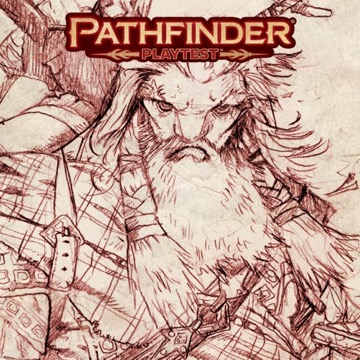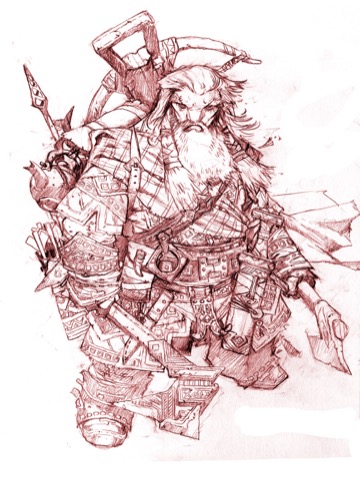Rangers have a long tradition in heroic adventure. Whether they're portrayed as lone striders keeping the edges of the wilderness free of the threats that lurch forth from the world's shadows, as hunters tracking down fugitives or beasts, or as skilled archers serving as a scouting force for a local lord or group of village elders, rangers have a special place in our fantastical imagination.
For the Pathfinder Playtest, we decided to cleave closer to the core principles of the ranger—a rough and tumble warrior in the wild, possibly of the wild himself. Because of this, the most significant change we made to the class was that it no longer has spellcasting ability, at least as a default. Of course, this doesn't mean we have to abandon this aspect of the Pathfinder First Edition ranger forever. Because of the way classes are now structured, it would be easy to create a spellcasting build of the ranger later using Spell Points (like the paladin), but for the Playtest, we are trying out a a spell-less ranger.
But enough of what the ranger doesn't have. Let's take a look at what he does.
Ranger Features
First and foremost, the ranger is a hunter. In Pathfinder First Edition, you picked creature types or subtypes that you were skilled at hunting. There are few things more frustrating than playing a ranger who rarely—or worst of all, never—encounters their favored enemies. It also led to some players who tended to play in more human-centric campaigns picking the human subtype, even if their backgrounds may have pointed to better choices for favored enemies.
This time we made the ranger hunting ability a bit more flexible, based on some popular ideas from the guide archetype and the slayer's studied target. At 1st level, rangers gain the Hunt Target feature.
[[A]] Hunt Target
Ranger
Requirements You can see or hear the target.
You designate a single creature within 100 feet as your target and focus your attacks against that creature. While hunting that creature, you gain benefits for focusing your attacks. As long as all your attacks in a round are against the target you're hunting, the multiple attack penalty you take on the second attack is -4 (-3 with an agile weapon) instead of -5, and -8 (-6 with an agile weapon) instead of -10 on the third and any further attacks in the round. You also ignore the penalty for making ranged attacks against the target you're hunting within your second range increment. You also gain a +2 circumstance bonus to Perception checks when you Seek your target and a +2 circumstance bonus to Survival checks when you Track your target.
You can have only one creature designated as the target of your hunt at a time. If you use Hunt Target against a creature when you already have a creature designated, the prior creature loses the designation and the new target gains the designation. In any case, this designation lasts until your next daily preparation.
There are many class feats and some higher-level abilities that augment the ranger's Hunt Target. For example, at 17th level, the masterful hunter feature decreases the ranger's multiple attack penalty to -3 (or -2 with agile weapon) with his second attack and -6 (or -4 with agile weapons) on his third or further attack, and he can ignore the penalty against the target of his hunt in the second or third range increment, assuming that he has at least master proficiency in the weapon he is. Speaking of which, like the fighter, the ranger gains weapon mastery for a group of weapons, though he gains it at 13th level instead of at 3rd level like the fighter. At 19th level, the ranger gains the swift target feature, which allows him to use Hunt Target as a free action triggered before he makes his first Strike each round, so he's never without a target to hunt! The specifics of the Hunt Target ability make the ranger excel at a variety of combat styles, especially his traditional two-weapon fighting (since you can decrease the multiple attack penalty with agile attacks to be incredibly small) and archery (since you eliminate some of the most common ranged increment penalties). Of course, a ranger with a less traditional style, like a greatsword with a reduced multiple attack penalty, works great too!
Other class features allow the ranger to stalk and avoid his foes. At 5th level, he gains trackless step. At 7th level, he gains evasion (followed by improved evasion at 15th level). He gains nature's edge at 9th level, which allows him to treat enemies in natural difficult terrain or in difficult terrain resulting from a snare (more on snares later!) as flat-footed. Come 11th level, he gains the wild stride feature, which allows him to ignore or minimize the effects of difficult terrain.
Ranger Feats
Class feats, of course, determine the flavor of individuals within a class, and the ranger is no different. Specific ranger feats allow him to gain an animal companion at the same progression as a druid's, though potentially with special benefits that only a ranger can obtain. Other feats will enable him to further focus on his weapon choice, including a whole string of feats that allow him to specialize in two-weapon fighting.
Some fun feats allow the ranger to use his knowledge and senses to aid his allies as well as himself. Here are a couple of my favorites.
Monster Hunter Feat 1
Ranger
When you critically succeed to identify a target you're hunting with Recall Knowledge, you (and your allies, if you tell them) gain a +1 circumstance bonus to your next attack roll against it, but not against other creatures of that species. The creature is bolstered.
[[F]] Scout's Warning Feat 4
Ranger
Trigger You are about to roll Perception for initiative.
You audibly or visually warn your allies of danger, granting them a +1 circumstance bonus to their initiative rolls.
Harkening back to the hunter's bond class feature in Pathfinder First Edition, these feats allow the ranger to support the rest of the group with increased flexibility in how he chooses to do so, and these are just a few. The ranger can expand on Monster Hunter to grant even more benefits with a successful Recall Knowledge and even share the benefits of Hunt Target with other PCs (pretty much any martial class will love this benefit). And while flanking-savvy fighters might be a rogue's traditional best friend, the 12th-level Distracting Shot feat allows the ranger who hits a target with two ranged attacks in the same turn to leave that critter flat-footed until the start of the ranger's next turn. This helps fast rogues bring the pain quickly and farther away from more heavily armored support.
Another group of feats allows you to create snares. (Told you I'd get to that!)
Snares
Like alchemy, the ability to create snares is granted by a general feat (Snare Crafting). And like alchemists, rangers have the potential to lift general snare crafting to greater heights.
What are snares? Well, they're small portable hazards, very similar to traps, which can be set up in a short period of time (usually 1 minute). While it's unlikely that you will set up a snare in the midst of combat, they are perfect tools to arrange a battleground to your advantage. For instance, remember the nature's edge class feature that allows you to treat enemies in difficult terrain as flat-footed? Here's the most basic snare that creates difficult terrain.
Slowing Snare Snare 1
Consumable, Mechanical, Snare, Trap
Price 2 gp
A square with this snare becomes difficult terrain when the first creature enters it, and then it is destroyed.
Other snares set off alarms, trip, or deal damage to those entering the area of a snare. Grab some alchemical items, and you can deal even more damage with a snare.
Freezing Snare Snare 8
Cold, Consumable, Mechanical, Snare, Trap
Price 50 gp
You set a trio of liquid ice bombs to explode in unison when a creature enters the freezing snare's square. The target must attempt a DC 22 Reflexsave.
Success The target takes 1d8 cold damage.
Critical Success The target is unaffected.
Failure The target takes 3d8 cold damage and is hampered 10 until the end of its next turn.
Critical Failure The target takes 6d8 cold damage and is hampered 10 until the end of its next turn.
Craft Requirements three vials of liquid ice
Ranger feats that deal with snares allow you to learn more of them as your Crafting rank increases, lets you set them up faster (even in the middle of combat), and increases snares' DCs to match your class DC. Always make sure that your allies know where you hid your snares, or no bonus to attack rolls or initiative that you grant them will make up for the damage and humiliation you might cause.
Stephen Radney-MacFarland
Senior Designer










